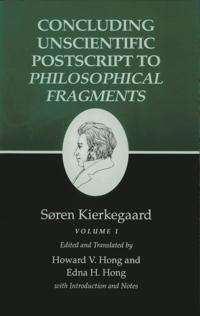Selections from the Writings of Soren Kierkegaard (Häftad)
avSoren Kierkegaard, Thomas S. Kepler
ISBN: 9781258136840 - UTGIVEN: 201110Soren Kierkegaard: Philosophical Fragments (Häftad)
avSoren Kierkegaard, Johannes Climacus
ISBN: 9781463529437 - UTGIVEN: 2011-05Kierkegaard (Pocket)
avSoren Kierkegaard
ISBN: 9780521612692 - UTGIVEN: 2006-07-20In this rich and resonant work, Soren Kierkegaard reflects poetically and philosophically on the biblical story of God's command to Abraham, that he sacrifice his son Isaac as a test of faith. Was Abraham's proposed action morally and religiously justified or murder? Is there an absolute duty to God[...]
The Essential Kierkegaard (Häftad)
avSoren Kierkegaard
ISBN: 9780691019406 - UTGIVEN: 200005This is the most comprehensive anthology of Sren Kierkegaard's works ever assembled in English. Drawn from the volumes of Princeton's authoritative Kierkegaard's Writings series by editors Howard and Edna Hong, the selections represent every major aspect of Kierkegaard's extraordinary career. They r[...]
Kierkegaard's Writings (Häftad)
avSoren Kierkegaard
ISBN: 9780691020112 - UTGIVEN: 198102This edition replaces the earlier translation by Walter Lowrie that appeared under the title The Concept of Dread. Along with The Sickness unto Death, the work reflects from a psychological point of view Soren Kierkegaard's longstanding concern with the Socratic maxim, "Know yourself." His ontologic[...]
Kierkegaard's Writings: v. 19: Sickness Unto Death: A Christian Psychological Exposition for Upbuilding and Awakening (Pocket)
avSoren Kierkegaard
ISBN: 9780691020280 - UTGIVEN: 1983-11-01Kierkegaard's Writings (Häftad)
avSoren Kierkegaard
ISBN: 9780691020419 - UTGIVEN: 198801Soren Kierkegaard, the nineteenth-century Danish philosopher rediscovered in the twentieth century, is a major influence in contemporary philosophy, religion, and literature. He regarded Either/Or as the beginning of his authorship, although he had published two earlier works on Hans Christian Ander[...]
Kierkegaard's Writings (Häftad)
avSoren Kierkegaard
ISBN: 9780691020495 - UTGIVEN: 1988-11"Stages on Life's Way", the sequel to "Either/Or", is an intensely poetic example of Kierkegaard's vision of the three stages, or spheres, of existence: the esthetic, the ethical, and the religious. With characteristic love for mystification, he presents the work as a bundle of documents fallen by c[...]
Kierkegaard's Writings (Häftad)
avSoren Kierkegaard
ISBN: 9780691020662 - UTGIVEN: 199105For Self-Examination and its companion piece Judge for Yourself! are the culmination of Sren Kierkegaard's "second authorship," which followed his Concluding Unscientific Postscript. Among the simplest and most readily comprehended of Kierkegaard's books, the two works are part of the signed direct [...]
Kierkegaard's Writings (Häftad)
avSoren Kierkegaard
ISBN: 9780691020723 - UTGIVEN: 199201A work that "not only treats of irony but is irony," wrote a contemporary reviewer of "The Concept of Irony, with Continual Reference to Socrates". Presented here with Kierkegaard's notes of the celebrated Berlin lectures on "positive philosophy" by F.W.J. Schelling, the book is a seedbed of Kierkeg[...]
Kierkegaard's Writings (Häftad)
avSoren Kierkegaard
ISBN: 9780691020815 - UTGIVEN: 199204In "Philosophical Fragments" the pseudonymous author Johannes Climacus explored the question: What is required in order to go beyond Socratic recollection of eternal ideas already possessed by the learner? Written as an afterword to this work, "Concluding Unscientific Postscript" is on one level a p[...]
Kierkegaard's Writings: v. 12, Pt. 2: Concluding Unscientific Postscript to "Philosophical Fragments" (Övrig)
avSoren Kierkegaard
ISBN: 9780691020822 - UTGIVEN: 1992-06-15In "Philosophical Fragments" the pseudonymous author Johannes Climacus explored the question: What is required in order to go beyond Socratic recollection of eternal ideas already possessed by the learner? Written as an afterword to this work, "Concluding Unscientific Postscript" is on one level a p[...]
The Humor of Kierkegaard (Häftad)
avSoren Kierkegaard
ISBN: 9780691020853 - UTGIVEN: 200407Who might reasonably be nominated as the funniest philosopher of all time? With this anthology, Thomas Oden provisionally declares Sren Aabye Kierkegaard (1813-1855)--despite his enduring stereotype as the melancholy, despairing Dane--as, among philosophers, the most amusing. Kierkegaard not only ex[...]
Kierkegaard's Writings, The: v. 24: Book on Adler (Inbunden)
avSoren Kierkegaard
ISBN: 9780691032276 - UTGIVEN: 1998-03-16Kierkegaard's Writings: v. 10: Three Discourses on Imagined Occasions (Inbunden)
avSoren Kierkegaard
ISBN: 9780691033006 - UTGIVEN: 1993-07-12Encounters with Kierkegaard: A Life as Seen by His Contemporaries (Övrig)
avSoren Kierkegaard
ISBN: 9780691058948 - UTGIVEN: 1998-07-01Encounters with Kierkegaard is a collection of every known eyewitness account of the great Danish thinker. Through many sharp observations of family members, friends and acquaintances, supporters and opponents, the life story of this elusive and remarkable figure comes into focus, offering a rare po[...]
Kierkegaard's Journals and Notebooks: Volume 1: Journals AA-DD (Övrig)
avSoren Kierkegaard
ISBN: 9780691092225 - UTGIVEN: 2007-01-22I would like to write a novel in which the main character would be a man who got a pair of glasses, one lens of which reduced images as powerfully as an oxyhydrogen microscope, and the other of which magnified on the same scale, so that he perceived everything relatively. A flight of fancy by an as[...]
Kierkegaard's Journals and Notebooks: Volume 2: Journals EE-KK (Övrig)
avSoren Kierkegaard
ISBN: 9780691133447 - UTGIVEN: 2008-02-11Soren Kierkegaard (1813-55) published an extraordinary number of works during his lifetime, but he left behind nearly as much unpublished writing, most of which consists of what are called his "journals and notebooks." Volume 2 of this 11-volume edition of Kierkegaard's Journals and Notebooks includ[...]
Kierkegaard's Journals and Notebooks: Volume 3: Notebooks 1-15 (Övrig)
avSoren Kierkegaard
ISBN: 9780691138930 - UTGIVEN: 2010-02-21Sren Kierkegaard (1813-55) published an extraordinary number of works during his lifetime, but he left behind nearly as much unpublished writing, most of which consists of what are called his "journals and notebooks." Volume 3 of this 11-volume edition of Kierkegaard's Journals and Notebooks include[...]
Kierkegaard's Writings (Häftad)
avSoren Kierkegaard
ISBN: 9780691140728 - UTGIVEN: 200906"Early Polemical Writings" covers the young Kierkegaard's works from 1834 through 1838. His authorship begins, as it was destined to end, with polemic. Kierkegaard's first published article touches on the theme of women's emancipation, and the other articles from his student years deal with freedom [...]
Kierkegaard's Writings (Häftad)
avSoren Kierkegaard
ISBN: 9780691140735 - UTGIVEN: 200906Prefaces was the last of four books by Sren Kierkegaard to appear within two weeks in June 1844. Three Upbuilding Discourses and Philosophical Fragments were published first, followed by The Concept of Anxiety and its companion--published on the same day--the comically ironic Prefaces. Presented as [...]
Kierkegaard's Writings: v. X: Three Discourses on Imagined Occasions (Övrig)
avSoren Kierkegaard
ISBN: 9780691140742 - UTGIVEN: 2009-06-04"Three Discourses on Imagined Occasions" was the last of seven works signed by Kierkegaard and published simultaneously with an anonymously authored companion piece. "Imagined Occasions" both complements and stands in contrast to Kierkegaard's pseudonymously published "Stages on Life's Way". The two[...]
Kierkegaard's Writings: v. XIII: "Corsair Affair" and Articles Related to the Writings (Övrig)
avSoren Kierkegaard
ISBN: 9780691140759 - UTGIVEN: 2009-07-03The Corsair affair has been called the "most renowned controversy in Danish literary history." At the center is Sren Kierkegaard, whose pseudonymous Stages on Life's Way occasioned a frivolous and dishonorable review by Peder Ludvig Mller. Mller was associated with The Corsair, a publication notorio[...]

























